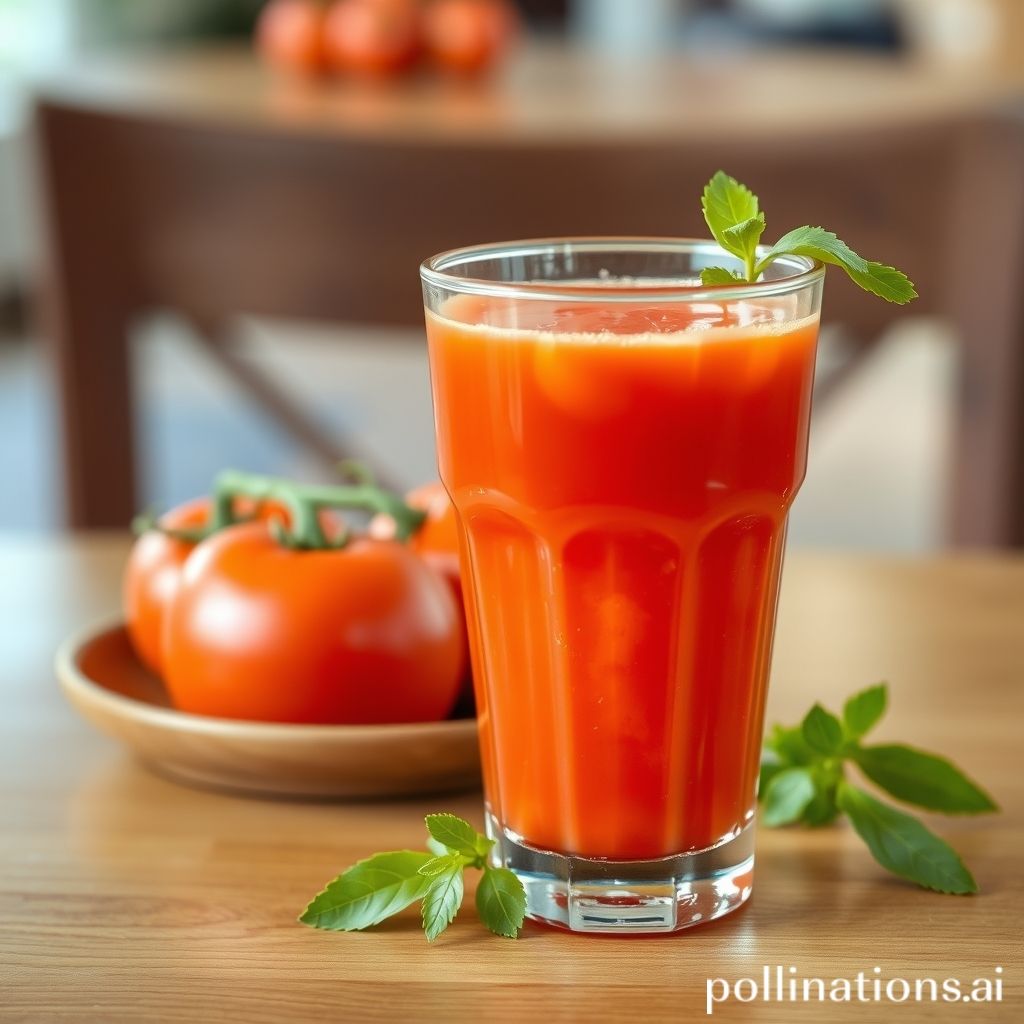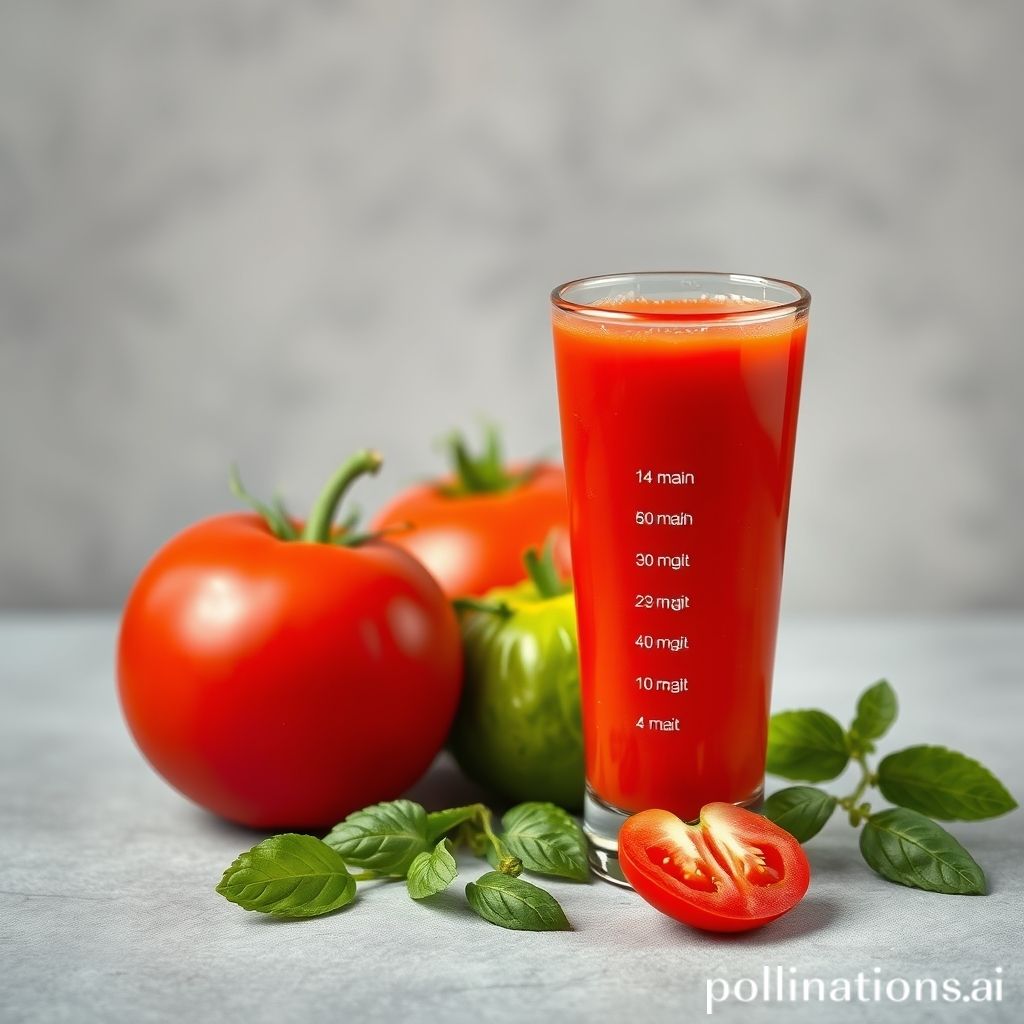Is Tomato Juice Bad For Gout?
Are you a gout sufferer who enjoys the refreshing taste of tomato juice? If you’ve ever questioned whether this beverage is helping or hurting your condition, you’re not alone. In this article, we’ll delve into the connection between tomato juice and gout, providing valuable insights to help you make informed decisions about your diet.
Discover the potential impact of tomato juice on gout, explore its nutritional content, and learn how to incorporate it into your gout-friendly eating plan. Don’t miss out on this essential information that can empower you to effectively manage your gout.

Table of Contents
Is Tomato Juice Bad For Gout?
What is gout?
Gout is a type of arthritis caused by the buildup of uric acid crystals in the joints. It is characterized by sudden and severe attacks of pain, redness, and swelling in the affected joints. Gout commonly affects the big toe, but it can also affect other joints such as the ankles, knees, wrists, and elbows.
Definition and symptoms of gout
Gout occurs when there is an excess of uric acid in the blood, a condition known as hyperuricemia. Uric acid is a waste product that is produced when the body breaks down purines, which are found in certain foods and drinks. When uric acid levels become too high, it can form crystals that deposit in the joints, leading to gout attacks.
The symptoms of gout typically include intense pain, swelling, redness, and tenderness in the affected joint. The pain can be so severe that even the weight of a bedsheet can cause discomfort. Gout attacks often occur suddenly and can last for a few days or weeks. Some individuals may also experience fever and a general feeling of being unwell during an attack.
Causes and triggers of gout
Several factors can contribute to the development of gout. These include genetics, obesity, certain medical conditions (such as high blood pressure and kidney disease), and lifestyle choices (such as excessive alcohol consumption and a diet high in purine-rich foods).
Certain foods and drinks have been identified as triggers for gout attacks. These include organ meats (such as liver and kidneys), seafood (such as shellfish and anchovies), red meat, sugary drinks, and alcohol, particularly beer. However, the impact of specific foods, such as tomato juice, on gout can vary from person to person.
To manage gout, it is recommended to maintain a healthy weight, limit alcohol consumption, drink plenty of water, and follow a balanced diet low in purines. Medications may also be prescribed to reduce uric acid levels and prevent gout attacks.
It’s important to consult with a healthcare professional for personalized advice and guidance regarding dietary choices for gout management. While the impact of tomato juice specifically on gout is yet to be determined, incorporating a variety of fruits and vegetables into a balanced diet is generally beneficial for overall health.
Manage gout with a healthy weight, limited alcohol, and a low-purine diet. Consult a professional for personalized advice. Eat a variety of fruits and vegetables.Is Tomato Juice Bad For Gout?
Role of diet in managing gout
Gout is a form of arthritis caused by the accumulation of uric acid crystals in the joints. While medication is crucial for managing gout, following a gout-friendly diet is equally important. A well-planned diet can help reduce the frequency and severity of gout attacks and lower uric acid levels in the body.
Importance of following a gout-friendly diet
Adopting a gout-friendly diet offers significant benefits for individuals with gout. By making dietary changes, one can effectively manage the condition and improve their overall quality of life. A gout-friendly diet focuses on reducing the intake of purine-rich foods, which increase uric acid levels. It also emphasizes consuming foods that help lower uric acid levels and promote overall health.
Foods to avoid for gout sufferers
Limiting or avoiding certain foods is crucial for managing gout. These foods are high in purines, which are broken down into uric acid in the body. By avoiding or reducing the consumption of these foods, individuals can prevent the accumulation of uric acid crystals and reduce the risk of gout attacks. Common foods to avoid for gout sufferers include:
| Foods to Avoid | Reason |
|---|---|
| Organ meats: Liver, kidneys, and sweetbreads | High in purines |
| Seafood: Anchovies, sardines, mussels, and scallops | Rich in purines |
| Red meat: Beef, lamb, and pork | Contains high levels of purines |
| Alcohol: Beer, wine, and liquor | Increases uric acid production and impairs its excretion |
| Sugary drinks: Soda and fruit juices | Associated with higher uric acid levels |
By avoiding or limiting these foods, individuals with gout can better manage their condition and reduce the risk of painful flare-ups. It is important to consult with a healthcare professional or a registered dietitian to create a personalized gout-friendly diet plan that suits individual needs and preferences.
Nutritional Content of Tomato Juice
Overview of Tomato Juice Composition
Tomato juice is a popular beverage known for its refreshing taste and potential health benefits. It is made from the extraction of tomatoes, which are known for their rich nutrient profile. Understanding the composition of tomato juice can help you make informed decisions about incorporating it into your diet.
Tomato juice is primarily composed of water, making it a hydrating choice. It also contains essential vitamins, minerals, and antioxidants that contribute to its nutritional value. Additionally, tomato juice is low in calories and fat, making it a suitable option for those watching their weight.
Key Nutrients in Tomato Juice
1. Vitamins:
– Vitamin C: Tomato juice is an excellent source of vitamin C, which plays a vital role in supporting the immune system and promoting collagen production.
– Vitamin A: Tomato juice contains vitamin A, which is essential for maintaining healthy vision and supporting the immune system.
– Vitamin K: Tomato juice provides vitamin K, which contributes to proper blood clotting and bone health.
2. Minerals:
– Potassium: Tomato juice is a good source of potassium, an electrolyte that helps regulate blood pressure and maintain proper heart function.
– Magnesium: Tomato juice contains magnesium, which is involved in various biochemical reactions in the body and supports bone health.
– Iron: Tomato juice provides a small amount of iron, which is necessary for red blood cell production and oxygen transport.
3. Antioxidants:
– Lycopene: Tomato juice is rich in lycopene, a powerful antioxidant that gives tomatoes their red color. Lycopene has been associated with various health benefits, including reducing the risk of certain cancers and promoting heart health.
Incorporating tomato juice into your diet can be a nutritious choice due to its high water content, essential vitamins, minerals, and antioxidants. However, it’s important to note that individual nutritional needs may vary, and it’s always advisable to consult with a healthcare professional or registered dietitian for personalized advice.

Is Tomato Juice Bad For Gout?
A. Purine Content in Tomatoes and its Effect on Gout
Tomatoes, including tomato juice, contain moderate levels of purines. Purines are natural substances that are broken down into uric acid in the body, which can contribute to gout. Individuals with gout are often advised to limit their intake of high-purine foods to manage their condition. However, consuming tomato juice in moderation is generally not a cause for concern for individuals with gout. It’s important to note that sensitivity to purines may vary among individuals.
B. Studies and Research on Tomato Juice and Gout
Research suggests that tomato consumption, including tomato juice, may not significantly increase the risk of gout or trigger gout attacks. A study published in the journal “Arthritis Research & Therapy” found no association between tomato consumption and increased gout risk in men. Another study published in the “Journal of Rheumatology” reported that tomato consumption was not linked to increased gout flares in individuals with existing gout.
While these studies focused on whole tomatoes or tomato consumption in general, it is reasonable to assume that the findings may be applicable to tomato juice as well, since it is derived from tomatoes.
In conclusion, tomato juice, like tomatoes, contains moderate levels of purines. Current research suggests that consuming tomato juice in moderation is unlikely to significantly impact gout or trigger gout attacks. As always, it is advisable to consult with a healthcare professional or registered dietitian for personalized recommendations regarding dietary considerations for gout.
| Information |
|---|
| Tomatoes contain moderate levels of purines |
| Tomato juice may not significantly increase the risk of gout |
| Studies suggest tomato consumption is not linked to gout flares |
| Consult a healthcare professional or registered dietitian for personalized recommendations |
Is Tomato Juice Bad For Gout?
Recommendations for Consuming Tomato Juice with Gout
When managing gout, it’s important to make informed choices about your diet. Tomato juice is generally considered healthy, but its natural compounds may affect gout. However, you can still enjoy tomato juice as part of a balanced diet by practicing moderation and combining it with other gout-friendly foods. Here are some recommendations:
Moderation and Portion Control
- Limit your intake: Consume tomato juice in moderation to avoid triggering gout symptoms. Stick to a serving size of about 1 cup (240 ml) per day or less.
- Monitor uric acid levels: If you have gout, regularly monitor your uric acid levels. If you notice a spike after consuming tomato juice, consider reducing your intake further.
Combining Tomato Juice with Other Gout-Friendly Foods
- Pair with low-purine foods: Tomatoes contain moderate levels of purines, which can increase uric acid levels. Minimize the impact by combining tomato juice with low-purine foods like leafy greens, cucumbers, or celery.
- Add anti-inflammatory ingredients: Counteract potential inflammation by adding ingredients with anti-inflammatory properties, such as ginger or turmeric, to your tomato juice.
By practicing moderation, portion control, and combining tomato juice with other gout-friendly foods, you can enjoy the benefits while minimizing the risk of gout flare-ups. Remember to consult with your healthcare provider or a registered dietitian for personalized recommendations based on your specific condition.
Conclusion
Tomato juice can be included in a gout-friendly diet in moderation. Although tomatoes contain purines, the purine content in tomato juice is relatively low compared to other foods. It is important for individuals with gout to control their portion sizes and combine tomato juice with other gout-friendly foods for maximum nutritional benefits.
Consulting with a healthcare professional or registered dietitian is recommended for personalized advice on managing gout through diet. By following a balanced diet and making informed choices, individuals with gout can enjoy tomato juice as part of their overall dietary plan.
Faq about Tomato Juice and Gout
FAQ 1: Is tomato juice high in purines?
Tomato juice contains a moderate amount of purines. It is recommended that individuals with gout limit their intake of tomato juice.
FAQ 2: Can tomato juice trigger a gout attack?
Tomato juice can trigger gout attacks in some individuals. It contains purines, which can increase uric acid levels and lead to gout symptoms.
FAQ 3: How much tomato juice can I consume if I have gout?
It is best to consume tomato juice in moderation if you have gout. Consult with a healthcare professional for personalized advice on the appropriate amount.
FAQ 4: Are there any alternatives to tomato juice for gout sufferers?
Yes, there are alternatives to tomato juice for individuals with gout. Low-purine vegetable juices like cucumber or carrot juice can be good options to manage gout symptoms.
FAQ 5: Can cooked tomatoes be consumed instead of tomato juice for gout?
Cooked tomatoes can be a suitable alternative to tomato juice for individuals with gout. Cooking reduces the purine content, making them safer. Consume them in moderation and consult with a healthcare professional for personalized advice.

